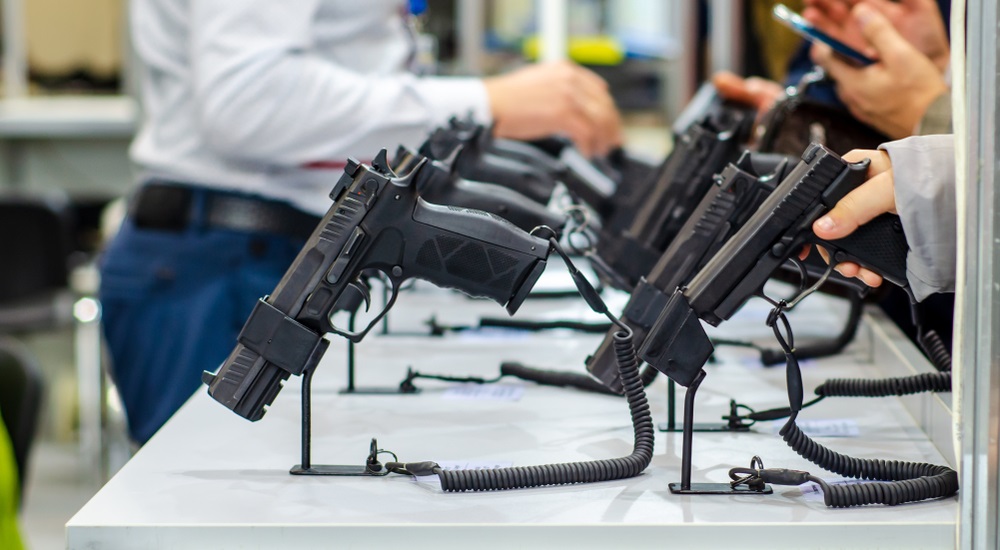The near-stagnant pace of federal gun law reform and lack of gun possession restrictions in Mississippi make it easy to get a gun in the Magnolia State — and for hundreds of them to end up on Chicago streets every year.
“The federal gun laws are, frankly, incredibly weak and structured in a manner that makes it difficult to hold people accountable for their adherence to the law,” said Daniel Webster, director of the Center for Gun Policy and Research at Johns Hopkins University.

Daniel Webster is a Johns Hopkins University researcher and director of its Center for Gun Policy and Research.
Congress has done little since the 1994 Brady Act, which required background checks of gun purchasers, to make gun trafficking harder, despite the increasing number of mass shootings in a range of locales, big and small, and homicides in large cities.
U.S. Rep. Carolyn Maloney (D-N.Y.), in February introduced five gun-control bills, including one that would crack down on “straw purchasers” who buy firearms with the intention of selling them illegally. Those purchasers include Mississippian Jonathan Smalley, who, in a pawn shop in his home state, bought the gun that killed Malcolm Stuckey in Chicago in 2014.
Maloney told the Mississippi Center for Investigative Reporting that police have informed her that they don’t even bother arresting gun traffickers in some cases because weak laws reduce such arrests to petty crimes.
“The laws were so lax that it was treated as a misdemeanor,” she said. Her proposed laws, which await congressional hearings, “would make trafficking guns and selling guns to gangsters, or whatever, a felony with 20 years in prison behind it.”
Mississippi Has Few Gun Rules
While federally licensed gun sellers in Mississippi must conduct background checks, that’s where the rules end.
Anyone 18 and older can buy a gun in Mississippi, although those under 21 must be accompanied by a parent or be a military veteran or on active duty. And anyone who buys a gun can sell it legally to someone else in Mississippi without a background check, making it difficult for investigators to track guns once they leave a shop.
“What some traffickers do is send someone in who may buy just one gun at one place, but then they’ll go to another place and buy another gun. It’s spread out so much that it’s hard to track.”” said Kurt Thielhorn, special agent in charge of a federal Bureau of Alcohol, Tobacco, Firearms and Explosives regional office that covers Mississippi.
Federal investigators said they couldn’t discuss many of their strategies for preventing straw purchasing and trafficking, fearing it might help traffickers further cover their tracks. They do, investigators said, routinely hold seminars for licensed gun sellers.
“We do a lot of education with our [dealers],” said Kristen de Tineo, special agent in charge of the ATF’s Chicago office. “‘Here’s how you identify a straw purchase and here’s how you report them.’”
Mississippi’s Republican-led Legislature has consistently scuttled efforts to enact stronger gun laws, said Laura Cutilletta, managing director of the Giffords Law Center, a gun-control advocacy group that grades states annually on their firearm laws. It’s given Mississippi an F every year since 2010.
“We are closer to the second coming of Jesus Christ than … gun control ...”

Kristen de Tineo is the special agent in charge of the federal Bureau of Alcohol, Tobacco and Firearms regional office in Chicago.
For example, a 2020 proposal to prevent people deemed a risk from owning firearms died without ever going to a vote or having a hearing. The bill’s author, State Sen. Robert Jackson, a Democrat from a small town in the Mississippi Delta, said it was discouraging to see even his “watered-down” bill die without consideration.
“People have a strange relationship with guns in Mississippi,” Jackson said. “It’s hard to understand, with the damage and carnage that they cause.
He said he doesn’t see himself proposing another gun law. “I think we are closer to the second coming of Jesus Christ than we are to passing gun control laws,” he added. “These people love their guns more than they do their own families.”
Neither Republican leaders in the House and Senate nor the state Republican party responded to repeated interview requests.
“There are so many things Mississippi could do that other states have done, but they always get blocked,” Cutilletta said.
Twenty-six states and the District of Columbia have laws regulating firearms dealers, with additional states requiring dealers to conduct background checks, retain records of sales or report sales to law enforcement, according to the Giffords Law Center.
Mississippi could and should limit the number of guns someone can buy at once, Cutilletta said: “Why would you really need to buy more than one gun a month?”
Gun shows represent a relatively wide-open market as well. Although some federally licensed dealers sell at those shows, so do plenty of unlicensed sellers who aren’t subject to background check requirements.
For more information on Youth Gun Violence Prevention, go to
► JJIE Resource Hub | Youth Gun Violence Prevention
“There’s very few restrictions on who can purchase a firearm,” said Courtney Weiland, who leads the Mississippi chapter of Moms Demand Action, a gun-control advocacy group. “What they are seeing is that, of course, individuals who are prohibited from buying a firearm are enlisting younger and younger people to buy these firearms for them.”
California, then New Jersey have the Tightest Gun Controls
California has the nation’s strongest gun laws, according to the Giffords score card. That state, unlike Mississippi, only allows gun sales through licensed dealers. It also requires a 10-day waiting period and universal background checks that allow no potential gun-buyer to go unscreened.
And New Jersey, which ranks second on the Giffords scorecard, was the first state to regulate “ghost guns,” do-it-yourself firearms that previously did not require background checks and were practically impossible to trace.
Mississippi’s laws are good enough, said Finley Hootsell, a Natchez gun dealer who sold at least one firearm to Jonathan Smalley that ended up in Chicago. It’s the prison time that needs to get stricter, he said.
“Make the punishment real,” Hootsell said. “Punish the criminals, put them in jail, keep them in jail. Don’t let them out because of something as silly as a COVID virus.”
This article is jointly published by the Mississippi Center for Investigative Reporting and Juvenile Justice Information Exchange, and supported by The Kendeda Fund. JJIE, a nonprofit news organization, is solely responsible for the content and editorially independent of its funders. Reporter Matt Krupnick is at matt@mattkrupnick.com.
